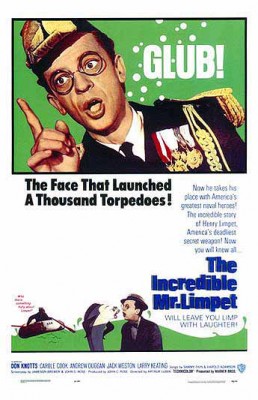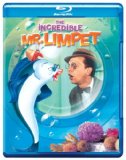| Reviews & Columns |
|
Reviews DVD TV on DVD Blu-ray 4K UHD International DVDs In Theaters Reviews by Studio Video Games Features Collector Series DVDs Easter Egg Database Interviews DVD Talk Radio Feature Articles Columns Anime Talk DVD Savant Horror DVDs The M.O.D. Squad Art House HD Talk Silent DVD
|
DVD Talk Forum |
|
|
| Resources |
|
DVD Price Search Customer Service #'s RCE Info Links |
|
Columns
|
|
|
Incredible Mr. Limpet, The
The film launched Don Knotts's starring career in feature comedies, a run that continued more or less into the early-1980s. Indeed, The Prize Fighter (1979) and The Private Eyes (1980), both co-starring Tim Conway, were the very last of an older, more innocent form of comedy stretching back to the silent era. (Somewhat incredibly, The Private Eyes is available on Blu-ray in all its high-def gloriousness.) However, The Incredible Mr. Limpet is much less the Don Knotts vehicle his other '60s starring films are, but very much in line with the conceptually oddball films and TV shows of director (and probably uncredited producer and co-writer)* Arthur Lubin.
Lubin made his mark directing Abbott & Costello's earliest (and generally best) films, but really struck gold when he created a seven-film series revolving around a talking mule named Francis. He adapted the same basic idea into the unaccountably long-running TV sitcom Mister Ed (1961-66), about a talking horse. Milking the genre further, Lubin also made Rhubarb (1951), about a millionaire cat whose assets include a Major League Baseball team, and The Incredible Mr. Limpet, about a talking man-fish aiding the war effort.
Warner's new Blu-ray replicates the supplemental content of the 2002 DVD version, including a Don Knotts interview, while the high-definition transfer greatly improves on that earlier edition, though problematic issues involving the very grainy animation remain.
The story opens in present-day Washington, D.C., with high-ranking Navy officers George Sickle (Jack Weston) and Harlock (Andrew Duggan) in a top secret archive discussing "him" with much dread and trepidation. It's filmed in such a way as to suggest Mr. Limpet's man-into-cartoon fish transformation was originally intended as a surprise for movie audiences, but that ultimately the advertising campaign opted to spill the beans.
Flashback to September 1941, where mild-mannered bookkeeper Henry Limpet (Knotts) largely ignores his wife, Bessie (Carole Cook) and best friend George Sickle, but is positively rapturous about fish, to the point of longing to become one himself. "I wish, I wish, I wish I were a fish," he quietly sings to himself. Limpet tries to enlist in the Navy like George but is declared 4-F, which depresses him. Then, on a pier at Coney Island, Limpet accidentally falls into the drink but rather than drown, he's magically transformed into a fish, rendered via cell animation. (The cartoon Limpet resembles Knotts.)
Though Bessie and George assume Limpet has drowned, in fish form Limpet is as happy as he can be. Limpet speculates nature somehow recognized and decided to correct its mistake, thus granting his desire to become a fish. The nonjudgmental tone of the film, of Limpet shedding an older, unwanted body and into a skin in which he feels more comfortable, leaving his past behind him, etc., invite suggestions of a sympathetic, pro-transgender subtext. (According to Wikipedia, Lubin, who died in 1995 at 96, was gay.)
Under the sea, Limpet befriends an ornery hermit crab he names Crusty (voiced by Paul Frees) and he falls in love with fish Limpet names Ladyfish (voiced by Elizabeth MacRae). Meanwhile, the United States joins the Allies after the bombing of Pearl Harbor and Limpet becomes more determined than ever to aid in the war effort. Soon he discovers a natural talent for locating Nazi U-boats and signaling their location to nearby Navy vessels with his thrum, Limpet's colossal belch-like roar, which is picked up on sonar.
The Incredible Mr. Limpet is a strange film on many levels. A disproportionate amount of screen time is devoted to Limpet's determination to contribute to the war effort, instead of following Limpet as he readjusts to his new life. Much of the picture plays out-of-synch with the times, coming as it did two decades after World War II. The reason for this is because Theodore Pratt's novel on which it was based, Mr. Limpet, was published in 1942, during the brief uncertainty of an Allied victory. (Pratt's Mr. Winkle Goes to War, a sort of fish- and fantasy-free Mr. Limpet, was published the following year and quickly made into a movie, with Edward G. Robinson.) Regardless, the film's tone is more akin to that era's wartime flag-wavers than the broad and sometimes scathing military satires common in the 1960s.
Don Knotts is very good as Limpet, however, making his passion for fish and joy at finally becoming one believable, while his basic decentness trumps the script's awkward implications, such as Limpet clearly getting turned on by flirtatious Ladyfish and then meekly confessing to being a married man. None of Knotts's starring vehicles are classics of screen comedy, but almost all of them are pleasant and at least mildly amusing, for which Knotts himself deserves the lion's share of the credit.
But the rest of the cast, especially Carole Cook as Mrs. Limpet, seems miscast. She and Knotts have zero chemistry and all opportunity for comedy in their scenes together is squandered. Jack Weston was a good actor in serious films, but here playing the slightly devious best friend he's technically okay but it's the wrong performance for this material.
And yet the movie has a certain likeability. Scenes of Limpet, in fish form, shouting "Ahoy there!" from the dark waters at passing naval vessels, freely offering tips on German subs to bemused crews, is uniquely humorous, and Limpet's final goodbye to Bessie, she aghast but wanting him to be happy, he insisting that he is, is almost moving.
Video & Audio
Presented in 1.78:1 full-frame and approximating its original 1.85:1 aspect ratio, The Incredible Mr. Limpet is a delight on Blu-ray. The film's primary color scheme on land pops off the screen, while the more pastel look underwater is also attractive, and the film is sharper and more detailed than ever before. The animation (mostly directed by Robert McKimson) but not the live action is on the soft-focus, grainy side, apparently an aesthetic decision, presumably to lessen the contrast between the live-action and cartoon material. That decision is effective insofar as scenes of Limpet sticking his head out of the (live-action) water, talking to George and whatnot technically looks perfect, but it's too bad the animation is as soft in appearance as it is. The DTS-HD Master Audio (1.0 mono) sounds fine, and includes an optional Spanish track, and English SDH and Spanish subtitles.
Extra Features
All the special features from the 2002 DVD have been retained, including a video introduction by Don Knotts; a trailer (introduced by Arthur Godfrey); and "Mr. Limpet's Fish Tank," in which Knotts discusses the various characters (he has little to say, alas). The best extra is Weekend at Weeki Wachee, a color theatrical short promoting the film and covering its underwater premiere at a Florida water park.
Parting Thoughts
Not quite a classic, The Incredible Mr. Limpet is pleasant if peculiar, with an engaging lead performance and the germ of a great film lurking in there somewhere. The Blu-ray is a big improvement over the DVD and comes Recommended.
* One "John C. Rose" is credited as producer and co-writer, but as he has no other credits, and considering Lubin was concurrently producing Mr. Ed, and thus disinclined to work as a hired hand on someone else's picture in his spare time, I suspect Rose and Lubin are one and the same.
Stuart Galbraith IV is a Kyoto-based film historian whose work includes film history books, DVD and Blu-ray audio commentaries and special features. Visit Stuart's Cine Blogarama here.
|
| Popular Reviews |
| Sponsored Links |
|
|
| Sponsored Links |
|
|
| Release List | Reviews | Shop | Newsletter | Forum | DVD Giveaways | Blu-Ray | Advertise |
|
Copyright 2024 DVDTalk.com All Rights Reserved. Legal Info, Privacy Policy, Terms of Use,
Manage Preferences,
Your Privacy Choices | |||||||














